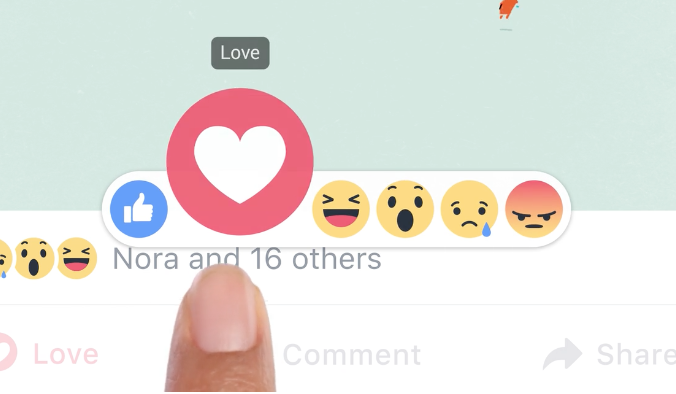Facebook Reactions just went live today.
In case you’ve been hibernating, Facebook rolled out the ability to add more reactions than just like to Facebook posts. Just hold down the Like button on mobile or hover over the Like button on desktop, and you’re presented with six new options: Like, Love, Haha, Wow, Sad or Angry.
My initial reaction? Like.
Not love… but anything that helps increase social bandwidth online is welcome in my book.
It’s a bit buggy, both in how it looks and in how it’s implemented. I’ve noticed the icons cut off in several contexts, the padding and alignment unbalanced, the layout odd when zoomed-in. Notifications are less useful now since likes are getting separated from other reactions. It’s also not terribly discoverable. I talked with several people who didn’t realize you had to hover over the like button to see the additional reactions (on desktop). It’s also confusing that you can only react to posts and not comments. Ultimately, though, the bugs will get fixed and people will get familiar with the new interface.
What I’ve been thinking more about is what this change would mean for the overall tone of Facebook conversations. For years, Facebook pushed back on the idea of a dislike button because they didn’t want it to be used to promote negativity or to gang up on people. Even with the new reactions, they’ve worked to keep the tone positive (with the exception of sad and angry, though I’d argue that those are still relatively sympathetic reactions). It’s clear that Facebook wants to make the service a welcoming place to share.
Right now, people write FB posts with the idea that the only binary reaction is like. So, for example, if you’re talking about your dad dying, most people wouldn’t just write “My dad died today” because no one’s going to like that. Not that someone posting is necessarily fishing for likes; but the subtle pressure for positive feedback is inescapable. The more people respond positively, the more likely what you wrote is to be seen by more people… and who doesn’t want more people to read what you’ve written? You’d probably be more likely write, “Dad’s gone. What a great hero he was!” That way, when people read it, it’s very clear to them: liking this means you think dad was a hero.
So I’m curious to see how the overall tone on Facebook changes because of the new reactions available. Will people be more likely to be blunt, knowing that readers can just click “Angry”? Will people feel less of a need to adjust what they’re saying in order to present their posts in a more positive way? And is this a good thing overall? Obviously, we’re talking about subtle changes here, but even subtle changes carry significance for a base of roughly 1.5 billion users.
There’s something that’s even more interesting to consider with these new reactions, though. Facebook will now have a much stronger indication as to the emotional content of your post. For years, they’ve been running language processing on posts to determine their emotional tone. In fact, you probably heard about the controversy in 2012 where Facebook manipulated the news feed content based on emotional content for a sampling of users, then tested the effect that had on the emotional content of their own likes and posts. Interestingly enough, Facebook found that peoples’ emotions were reinforced by what they saw — “emotional contagion”.
Now that Facebook has a more reliable way to measure emotional signals for your posts, what does that mean for the news feed algorithm and content delivery? Will they be less likely to promote posts that make people angry? Or will they mark you as a consistently “Angry” person and try to show you only “Haha” posts to calm you down? Will the “Haha” posts get subdued in the wake of a national tragedy, while “Sad” posts get more heavily weighted? Or will “Haha” posts be the cure to lift us out of our national (global?) depression?
It’s one thing to have Facebook show me posts because of perceived content relevance. But do I want Facebook deciding what to show me based on my perceived emotional state or the emotional content of my friend’s updates?

